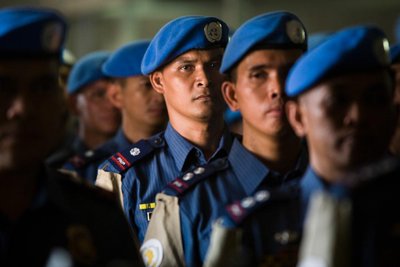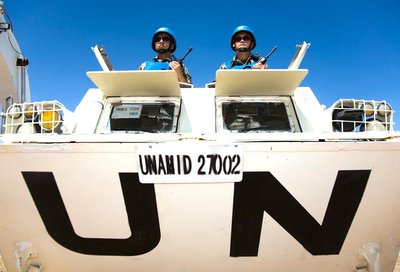The Darfur conflict
A civil war which broke out in 2003 led to the deaths of tens if not hundreds of thousands of Darfuris and the displacement of nearly two million. In the fighting between the Government of Sudan and militias and other armed rebel groups, widespread atrocities such as the murder and rape of civilians have been committed.
The UN raised the alarm on the crisis in Darfur in 2003, and finding a lasting resolution has been a top priority for the Security Council and two consecutive Secretaries-General.
Under the auspices of the African Union (AU) and with support of the UN and other partners, the Darfur Peace Agreement (DPA) was signed on 5 May 2006. As few parties signed on, a renewed peace process under a joint AU-UN mediator took place in Doha, Qatar, over 2010 through June 2011, producing a framework document. Intensive diplomatic and political efforts to bring the non-signatories into agreement with the Doha Document for Peace in Darfur continue.
The establishment of peacekeeping operations
Following the 16 November 2006 High-Level consultations in Addis Ababa, Ethiopia, the UN Department of Peacekeeping Operations (DPKO) augmented the existing African Union Mission in Sudan (AMIS) and prepared to deploy an unprecedented joint AU/UN peacekeeping operation in Darfur.
Intensive diplomacy by Secretary-General Ban Ki-moon and several actors in the international community resulted in Sudan’s acceptance of this force in June 2007.
The African Union - UN hybrid operation in Darfur was formally established by the Security Council on 31 July 2007 through the adoption of resolution 1769, referred to by its acronym UNAMID, under Chapter VII of the UN Charter. UNAMID formally took over from AMIS on 31 December 2007.
The mandate is renewed yearly, and the adoption of Security Council Resolution 2296 extended it until 30 June 2017.
UNAMID basic information
Mandate:
• Protect civilians, without prejudice to the responsibility of the Government of Sudan.
• Facilitate the delivery of humanitarian assistance by UN Agencies and other aid actors and the safety and security of humanitarian personnel.
• Mediate between the Government of Sudan and non-signatory armed movements on the basis of the Doha Document for Peace in Darfur (DDPD)
• Support to the mediation of community conflict, including through measures to address its root causes, in conjunction with UN country team.
Location:
The Mission’s headquarters is in El Fasher, North Darfur.
It has sector headquarters in El Geneina (West Darfur), Nyala (South Darfur), Zalingei (Central Darfur) and El Daein (East Darfur). The Mission has 35 deployment locations throughout the five Darfur states.
Deployment:
On 31 July 2007, the Mission had an authorized strength of 25,987 uniformed peacekeepers. This included 19,555 troops, 360 military observers and liaison officers, 3,772 police advisers and 2,660 formed police units (FPU). In mid-2011, UNAMID stood at 90 per cent of its full authorized strength, making it one of the largest UN peacekeeping operations.
By resolution 2063 of 31 July 2012, the Security Council decided to decrease strength of military and police components. The Mission has now an authorized strength of 23,743 personnel. This includes up to 19,248 uniformed peacekeepers (15,845 troops, 1,583 police advisers and 1,820 formed police units) and a civilian component of up to 4,495 peacekeepers (1,185 international staff, 340 UN volunteers, and 2,970 national personnel).
Budget: The budget of UNAMID is US$ 1,039,573.2 for the fiscal year 2016 - 2017.
The budget of UNAMID is US$ 1,039,573.2 for the fiscal year 2016 - 2017.
Challenges:
UNAMID is confronted with numerous logistical and security constraints as it must operate in unforgiving terrain and in a complex and often hostile political environment. The Mission also faces shortfalls in critical transport, equipment, infrastructure and aviation assets.
In the meantime, UNAMID is doing all in its power and with limited resources to provide protection to civilians in Darfur, facilitate the humanitarian aid operation, and help provide an environment in which peace can take root. The mission carries out more than 100 patrols daily. UNAMID also works to address some of the critical roots of the conflict.
Political process
UNAMID’s work is complemented by joint efforts on the political front. Until mid-2008, the Joint Mediation Support Team was led by the UN Secretary-General’s Special Envoy for Darfur, Jan Eliasson, and the AU Special Envoy for Darfur, Salim Ahmed Salim.
On 30 June 2008, UN Secretary-General Ban Ki-moon and AU Commission Chairperson Jean Ping appointed Djibril Yipènè Bassolé, the Foreign Minister of Burkina Faso, as the new joint AU-UN Chief Mediator for Darfur. As of 8 June 2011, Mr. Bassolé returned to Burkina Faso, and Ibrahim Gambari, Joint Special Representative (JSR) of UNAMID, became the Joint Chief Mediator ad interim. On 1 August 2012, UNAMID Deputy JSR (Political), Aichatou Mindaoudou, succeeded Mr. Gambari as Joint Chief Mediator a.i. On 20 December 2013, UN Secretary-General Ban Ki-moon and AU Commission Chairperson Nkosazana Dlamini-Zuma, appointed Mr. Mohamed Ibn Chambas of Ghana as UNAMID’s JSR and UN - AU Joint Chief Mediator. Following the departure of JSR Chambas, Abiodun Olerumi Bashua, from Nigeria, served as the Acting Joint Special Representative, and has now been succeeded by Martin Ihoeghian Uhomoibhi, also from Nigeria. JSR Uhomoibhi is also the Joint Chief Mediator for Darfur.
 UN
UN United Nations Peacekeeping
United Nations Peacekeeping




